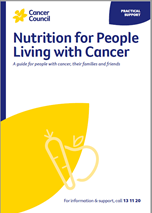Diarrhoea
Diarrhoea is when you have loose, watery bowel movements several times a day. You may also get cramping and pain, and have an urgent need to go to the toilet. Chemotherapy, radiation therapy to the abdomen (belly) or pelvis, some types of surgery (e.g. bowel), medicines, infections, reactions to certain foods, and anxiety can all cause diarrhoea. If the tips below don’t help improve diarrhoea, ask your doctor about anti-diarrhoea medicines and rest until you feel better.
For support managing constipation and diarrhoea, call the National Continence Helpline on 1800 33 00 66.
How to manage diarrhoea
- Drink plenty of water such as diluted cordials and oral rehydration solutions (e.g. Gastrolyte) to prevent dehydration. Avoid high-sugar drinks, alcohol, strong caffeine or very hot fluids.
- Watch for signs of dehydration such as dark yellow urine (pee) or urinating less than usual.
- Choose foods that are low in insoluble fibre (e.g. bananas, mashed potato, white rice, white pasta, white bread, steamed chicken without skin, white fish). It may also help to eat foods that are high in soluble fibre (e.g. oats, barley, rye, legumes, peeled fruits and vegetables, avocado, soy products).
- Avoid foods that are high in insoluble fibre (e.g. wholegrain breads, bran cereals, nuts and seeds, raw fruit, vegetable skins) and foods that increase bowel activity (e.g. spicy, fatty or oily foods, caffeine, alcohol or artificial sweeteners).
- Switch to soy milk or lactose-free milk for a period of time. Having diarrhoea may affect your ability to digest the natural sugar in milk (lactose).
→ READ MORE: Managing dumping syndrome
Podcast: Appetite Loss and Nausea
Listen to more episodes from our podcast for people affected by cancer
Jacqueline Baker, Senior Oncology Dietitian, Chris O’Brien Lifehouse, NSW; Lauren Atkins, Advanced Accredited Practising Dietitian, OnCore Nutrition, VIC; Dr Tsien Fua, Head and Neck Radiation Oncology Specialist, Peter MacCallum Cancer Centre, VIC; Rosemerry Hodgkin, 13 11 20 Consultant, Cancer Council WA; Clare Hughes, Manager, Nutrition Unit, Cancer Council NSW; John Spurr, Consumer; Emma Vale, Senior Dietitian, GenesisCare, SA; David Wood, Consumer.
View the Cancer Council NSW editorial policy.
View all publications or call 13 11 20 for free printed copies.
Need to talk?
Support services
Exercise and cancer
Exercise has many benefits both during and after cancer treatment, helping with side effects, speeding up recovery, and improving quality of life
Looking for transport, accommodation or home help?
Practical advice and support during and after treatment
Cancer information
Relaxation and meditation
Learn how relaxation and meditation can help you both during and after cancer treatment, or listen to our relaxation and meditation podcast
Cancer treatment
Learn about the different treatments that are used to treat cancer, such as surgery, chemotherapy, radiation therapy and targeted therapy
